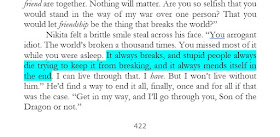These notes are from one of my favorites scenes in Red Rooster. I've been researching Vlad for a year-and-a-half now, so by the time I finally got to actually bring him to life on the page - I was nervous, and put a lot of pressure on myself. This was one of those scenes that proved to me that doing a ton of research is key to finding your footing in moments like these.
This is the Vlad readers will expect from casual mentions in documentaries, and over-the-top film depictions. The emotionless, unfeeling tyrant who drank the blood of babies.
Or is it?
I like to say that Vlad is the Middle Ages embodiment of "Look What You Made Me Do." He's got a list of names, and they're all in red, underlined. His father was betrayed, he himself was captured as a political hostage; his father and brother were murdered. Terrible things happened to his little brother. The Vlad who took the mantle of prince in Wallachia had an ax to grind, both with foreign enemies and traitorous nobles at home. Will I ever excuse his actions? No. But his motto was, more or less: "My name is Vlad Tepes, you killed by father, prepare to die...by impalement."
With the highlighted line above, he's - as will became clear after later books - mocking not only Nikita, but himself as well. Because Vlad was the very definition of "no chill." He wasn't rampaging-ly violent, but, rather, cold, cunning, and committed to grudges. Machiavellian in the extreme, he nevertheless managed to nurse personal hurts and carry out revenge in a way that would later be painted as "senseless" by some historians.
He was eventually betrayed by friends. So, again referring to the highlighted line, he doesn't see much value in friendship. Or...is it more a case of him feeling deeply, deeply hurt to know that his friends didn't value their friendship?
Themes I look forward to exploring in depth when I get to finally write from inside his head.
The poem "The Second Coming" by William Butler Yeats has always been a personal favorite and provides modern readers with some context for the idea that things are "the worst they've ever been." In the poem, we see reflected the idea that WWI marked the coming of the apocalypse for many. The Great War, or even simply THE War for many, seemed like the darkest days of human existence. An end to all things, insurmountable.
A sentiment that can be found all through history, at every major, devastating battle.
In the highlighted passage, we're seeing growth for Nikita. Born in the shadow of WWI, conscripted by the Bolsheviks to fight for a cause that he loathes, asked to do unspeakable things, and then thrown into the midst of the Great Patriotic War, Nikita has a hopeless outlook through most of White Wolf. Here, seventy-five years later and now immortal, we see that he's realized there will always be a new disaster. Once a fighter, a tsar's man, he's now a fatalist, and he doesn't want any part in anyone's war. He'll battle if he has to, for the people he loves, but he's nobody's solider anymore.
That's what he thinks.
Vlad would argue that if you're not a soldier, you're a victim.
It'll be fun to explore those contrasting (?) viewpoints as the series keeps progressing.
Oh, Alexei. I loved this exchange for nerd reasons - holy cow, I got to write Alexei Romanov and Vlad Tepes having a conversation! - and also because there's such a stark contrast between the two "princes."
Alexei was the only son of Nicholas and Alexandra, and therefore the de-facto heir. Vlad was not only a second son, but a second son in an age and a territory in which simple genetics weren't a guarantee of power. It was common for sons to ascend after fathers...but it was also common for leaders to be deposed, challenged, or forced to fight for their seats against bitter rivals. Prior to the collapse of the empire, Alexei had no such challenges.
Also, poor Alexei was sickly, and lived a largely indoor life. He was only a boy when the family was murdered; pair his youth with his disease, and he had very limited physical experience.
Contrast that with Vlad who was brought up a proper knight, both in his native Romania and during his time with the Ottomans. Swordsman, horseman, warrior, tactician - there were so "summer dachas and sailor suits" for Vlad.
(Also worth a chuckle was the real-life fact that Nicholas started a war based on the recommendation of the real-life Monsieur Philippe after the old man predicted victory during a séance. So...let's not talk about diplomacy, Alexei. Though his father was far more diplomatic that certain previous tsars.)
So...there you have it. My long-winded breakdown of one of my favorite scenes, and the thoughts that went into shaping it. Hope you enjoyed. Maybe this also shed some light on the reasons why it takes me so long to write a book 😊




No comments:
Post a Comment